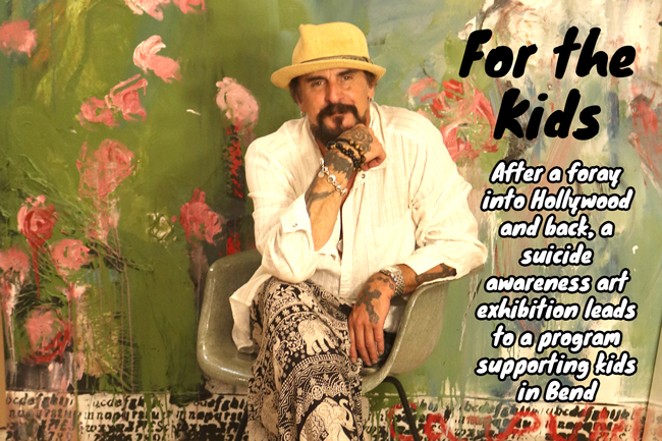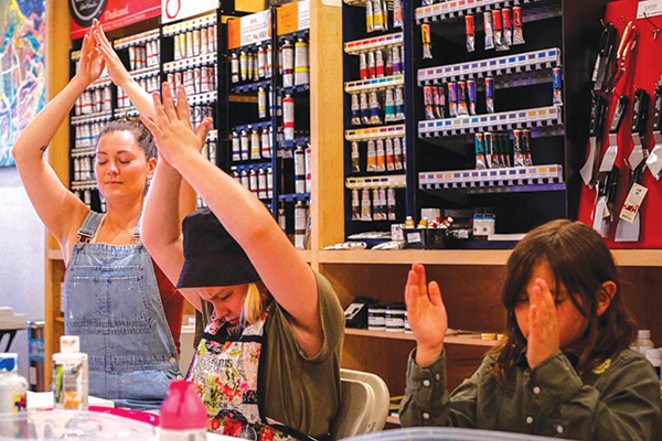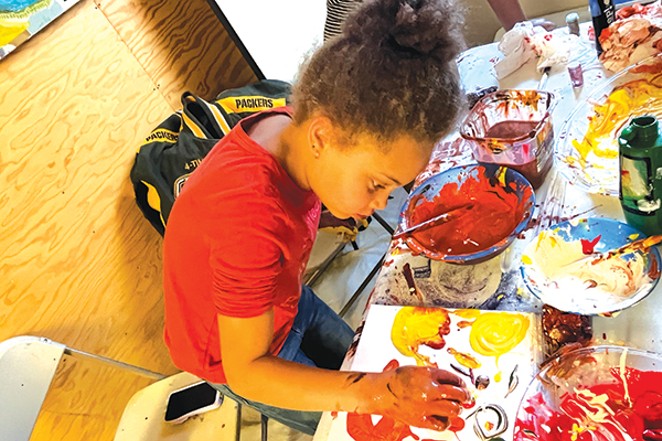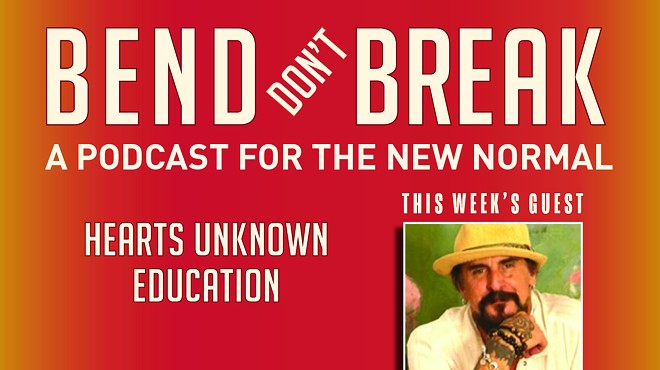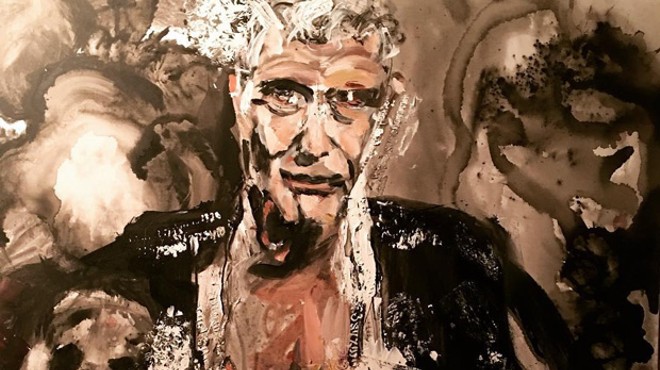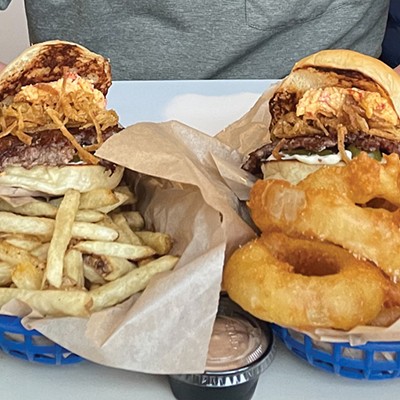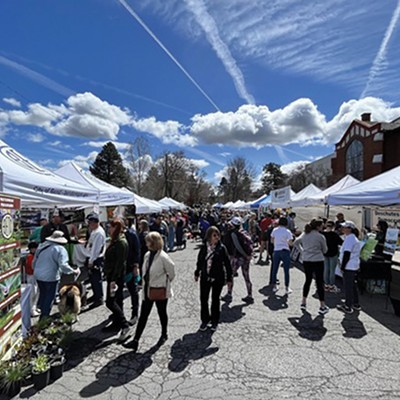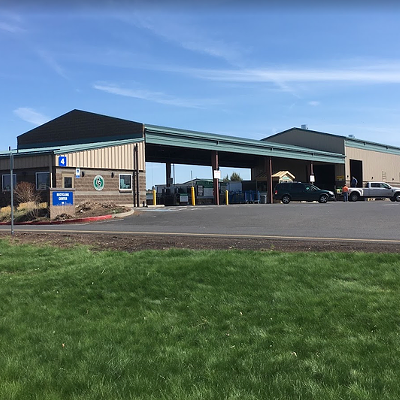In September 2019, a Source Weekly cover featured artist and musician Nicola Carpinelli gazing upward at one of his own paintings. It was the launch of Carpinelli's exhibit for Suicide Awareness Week, titled "Dead Poets"—an exhibit featuring artists who had died by suicide. The project had its roots in Bend, where the paintings were painted, but it went on to grab the attention of everyone from Jack Johnson to Peter Gabriel.
Carpinelli, an Italian-American artist who found his way to Bend after careers in Los Angeles and Seattle, described in a recent appearance on the Source Weekly podcast, "Bend Don't Break," how that project stemming from his own healing process morphed into a real Hollywood affair, and how now, after the worst of the pandemic appears over, the project is sowing new seeds in the ground where it was created.
In this Q&A, lightly edited for clarity and length, Carpinelli talks about the new project, Hearts Unknown Education, aimed at helping kids who are struggling with anxiety and depression right here in Bend.
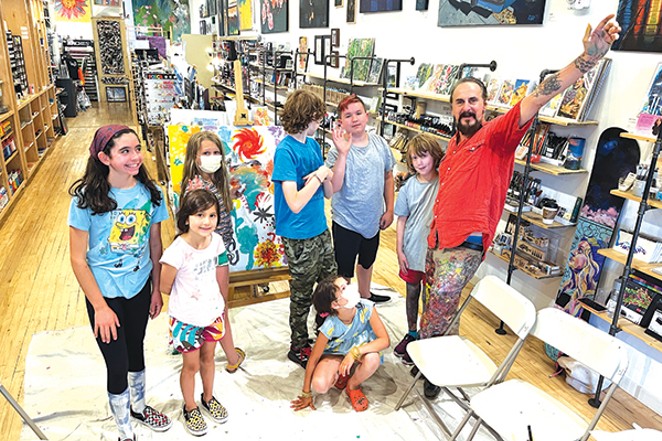
Source Weekly: What's been happening since you debuted the Dead Poets exhibit here in Bend?
Nicola Carpinelli: It'd basically been a time, a period where—I hadn't painted in like, 10 years and I had had struggles with alcohol and drugs in the past. And one of the benefits was that I wasn't able to paint when I was using drugs. So, I didn't have that association of, like, where it would be like a trigger for me. In fact, I painted horribly. One of the key things in painting is knowing when to stop. And I just didn't know when to stop.
When you use—what it does, is it mutes the heart, and I just didn't want to feel. And so obviously, when I stopped using, all of a sudden, those feelings came rushing back. And so [Anthony] Bourdain's death, who was like a hero to me, "Miles Davis cool," was just trying to teach the world how to live in an abundant way and joyful way. And I think a lot of people miss the mark with him. And anyway, when he passed I just was compelled to paint him. And that was one of my favorite paintings, as it was the title "Hearts Unknown," which is, you know, a play on his show "Parts Unknown." But then it ended up being part of our program that we're doing here in Bend for the kids—Hearts Unknown Education, which is us working with the kids.
That inspired me to go and paint Chris Cornell, who I knew. I just want not so much to glorify the suicide—the act of him taking his life—[it was] more or less an homage to these people, very sensitive people. And I thought to myself, well, maybe someone says to themselves, like, wow, I really relate to Anthony Bourdain, or I really relate to Chris Cornell. Wow, I'm going through the same things he's going through, what could I do different? You know, and what I want to do is essentially open up dialogue on the topic at a time when we were—when we did this 2019, suicide awareness, or speaking of it, or putting it in a newspaper, much less the cover, which I was so grateful for, was unheard of.
The important thing is that we need to talk about it and, you know, for the longest time, no one wants to say anything. It's like we're so scared in this country, like, since the beginning of landing on Plymouth Rock, I think we have avoided the conversation of death, and I think one of the beautiful things in other cultures is that they embrace it and they talk about it and honor it. I'm always surprised at how prevalent it is. Once you do start talking to somebody about it, how, how many people have someone they know taking their life for one reason or another. And once that opens up, a lot of conversations, there's a lot of conversations that people want to talk about it and different people have a different experience. Like, you know, a young person will have one perspective on it.
SW: Did you paint these in Bend?
NC: When I came up here to Bend, I hadn't painted. I was scared to even paint because I tried a couple times and it just wasn't... the magic wasn't there anymore. And I just thought, well, I'll move into something else or I'll go back to music or something like that. And when I came to Bend and then Anthony passed, that's when I sat down and I started painting, I'm like, whoa! OK, I'm maybe even painting better than I ever did. And then I went about painting. So it was like, literally, and within a year, I had accumulated all those paintings of Kurt Cobain, Robin Williams, Kate Spade, Ernest Hemingway and Margaux Hemingway.
And I wanted to kind of also show that there's different reasons. Like, we did David Bowie who was an assisted suicide, but I wanted to show the different reasons why people will end their life. Again, it's just an important thing for me to express it for some reason. Because I had had those feelings and I was younger. I was you know, 12 years old that I had a plan of what I was going to do, and it shouldn't be that way, you know? And so that's why I have such a passion for these kids. Because I am one of them and they have it harder than any other generation, I think.
The day after the [Dead Poets] event, Mariel Hemingway, and Dr. Howard Asher and I went to breakfast to kind of celebrate what was an amazing turnout and response and the community responding to the event. And we just kind of like scratch their heads and like, you know, the doctor I think was the one that said this needs to be a road show.
I'm like, 'well, what if we formed a nonprofit,' you know, and we did this kind of thing. Obviously, I think the key thing in mental health is you got to be effective. There's a lot of people that are not effective with suicide awareness. A lot of these suicide awareness gatherings are attended by maybe 20-30 people and then they end up having like 20 people on their board. So it's like them and inviting a few friends. So if there's some sort of magic, and somehow through the art and kids wanting to come and see, Kurt Cobain, you know, and like all these kids were like lining up to take their picture with Cobain—Cobain was the most popular, I think.
And I think that's what maybe took their guard down a little bit. When you tell your child—the kid may be depressed or whatever—and you say to him, 'oh, we're going to a suicide awareness event.' They'll just say, 'no, Mom,' you know? No thanks. But I think it was like, hey, there's an art show and it's about these people that have taken their lives. It really got that response.
So we're like, OK, let's do this nonprofit, and one of the things is like, OK, so what do we do when you do a nonprofit? Well, one of the things would be to do these little panel discussions and invite different mental health professionals. Boom. The second we get our 501c3, COVID-19. Whoo, thank you. And it just took the legs out from under it. But we were able to still do stuff and one of the blessings of having Mariel as a partner and one of the curses of having Mariel—we call it the Mariel effect.
A sample of the Muriel effect is I had this idea of doing a little gathering on the beach in Santa Barbara, where we do a procession, I have a few friends that are in Linkin Park [the band] and we were going to do an acoustic little thing and walk down the street and sing songs, and then form a heart on the beach, with candles and then maybe talk a little.
We got Jack Johnson, Alanis Morissette, wanting to sign up for this thing. I get stars in my eyes, too, you know— I'm susceptible. I'm like, oh, this is gonna be amazing. This is going to be a, "We Are the World." It's going to be a "Band-Aid," you know, so I got really excited about that and needless to say it just blew up to this point where it's like, I wouldn't be able to do this in the city. The city will never allow 100,000 people.
Because it started to get kind of bipolar, the whole thing, I'm like, we need to do this thing. It started as a grassroots thing in this little town called Bend, Oregon. And I think Bend mirrors every small town in this country.
On our website is, 'If we save one life, we save the world.' And OK, let's start with one. And so I decided to do this thing Hearts Unknown Education—HUE—and work with kids locally in the community. And I just put a little Facebook thing, like, hey guys, you know, if you know any kids that are struggling with depression or anxieties right now—I think recently CNN said something to the fact that 41% of kids considered suicide during the pandemic, and 5.1 million were diagnosed with anxiety in 2021, and then 2.1 million for depression.
I wanted to switch it from Hollywood to here. I feel most comfortable here. I have my own struggle still—just because I'm the founder of an organization on suicide prevention, doesn't mean I don't [struggle].
SW: Let's talk a little bit about the nuts and the bolts of the class. So it's creative expression for youth—kind of geared toward kids who are struggling. What does it look like?
NC: We, like, filled up these classes in two hours. We're doing it at Layor Art right downtown. We start our classes with a little meditation, cranio sacral therapist Sierra Tanner, she helps us with a meditation and we open our minds and hearts to creation and do a little somatic breath work, and focus. We'll play some beautiful music and then we'll go wild with Nicola and paint. And I'm like, all right guys, stick your hands in the air and I'll just put like buckets of paint, you know?
Because, at elementary school, they're like, 'just a little dab.' I want him to like put it on your face if you want to; put it on your clothes and I'll show you some pictures after the thing.
If I show you these pictures of these kids, at how happy they are, and you know, each of them has their own individual process. For some, it was right away, I'm in it. And like, this is fun. I have a couple of rock stars there that are, like, you know, they're coming in with sunglasses on. It's just it's brilliant, but then others, you know, it takes a little while for that to come out. And then now they're getting to know their friends that are there every week. And so the goal, you know, ultimately is to do this every day or five days a week, at least a place where the kids can land. One of the holes, I think in mental health is, as, you know there are a lot of people's hands are tied in that in that industry and in that they don't want to take it too far. Because they want to leave them raw because they're probably not going to see that kid for a month and then, you know, you got that 45-minute time with the therapist.
And so I want to have a space where kids can come every day, whether they come once a week or every day, it doesn't matter. They can paint, they can do some music, we'll have some soundproof rooms, where they can bang on drums. We can go graffiti on a wall. In the space just, like, let them cut loose. Have a place where they're happy—the happiest place in Bend for these kids.
SW: When they're in this process, is it art and for art's sake? In this case, do you work with them therapeutically at all? It is enough for them just to start expressing?
NC: It's enough just to have them express themselves. I'm not a licensed art therapist, but I do have Dr. Asher and Deborah Stone, who are.
SW: Are you still painting the Dead Poet series?
NC: I am not. Although there are, you know, in recent times there's been some paintings that I wanted to add to the collection. We decided that we wouldn't sell it ever—that it would just kind of travel with us wherever we do our public speaking and things like that. Right now what I'm doing is a little more free expression and kind of letting the paintings paint themselves.
Hearts Unknown Education student exhibit
Fri., Aug 12. 5-8pm
Layor Art + Supply
1000 NW Wall St. Ste. 110, Bend
deadpoetsfoundation.org/hue
IF YOU NEED HELP:
The National Suicide Prevention Lifeline
A hotline for individuals in crisis or for those looking to help someone else. To speak with a certified listener, call 1-800-273-8255.
The Veterans Crisis Line and Military Crisis Line
1-800-273-8255 Press 1 Connects veterans and service members in crisis and their families and friends with qualified, caring U.S. Department of Veterans Affairs responders through a confidential toll-free hotline, online chat, or text.
Crisis Text Line
Crisis Text Line is a texting service for emotional crisis support. To speak with a trained listener, text HELLO to 741741. It is free, available 24/7, and confidential.
The Trevor Project
Crisis support for LGBTQ+ youth. thetrevorproject.org/
Oregon YouthLine
A teen-to-teen crisis and helpline for youth and teens. Teens available to help daily from 4pm-10pm (off-hour calls are answered by the crisis line)
877-968-8491
Text: ‘teen2teen’ to 839863
oregonyouthline.org
Deschutes County 24-hour crisis phone line
Available 24/7 to anyone who is experiencing a crisis or needs crisis support.
541-322-7500 ext. 9
Walk-in crisis services
Provides immediate access to a Master’s level therapist for individuals experiencing a crisis. Open to people of all ages, regardless of ability to pay, in a safe and confidential environment. No appointment necessary. Brief stabilization.
Deschutes County Stabilization Center
63311 NE Jamison Street Bend, OR 97703
541-585-7210- Office Line (Non-Emergency)

